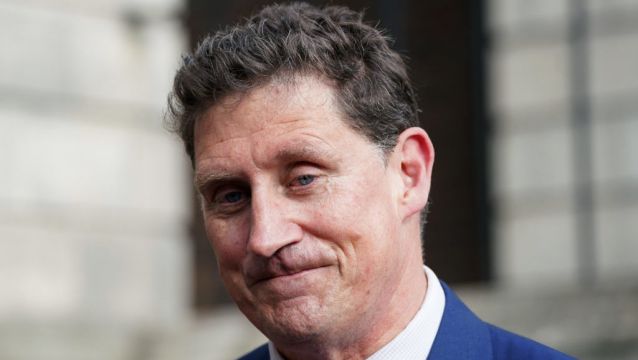Minister for the Environment, Climate and Communications Eamon Ryan has described the Cop28 agreement signed on Wednesday morning as “an historic deal”.
“It's historic because for 30 years, the United Nations process hasn't addressed the core of the problem on a day-t0-day and connects the two sides,” the Green Party leader told RTÉ radio’s Morning Ireland.
“But it's also historic and important in this way, because in a world divided and at war, when we are fraught with division and conflict and real climate impacts start to come home, it shows we can still unite, we can work collectively.”
Although conceding the deal is “not perfect”, Mr Ryan added: “But had we not got an agreement and delivered this package together, then that would have been a critically sad and difficult day for the world.”
“At the centre, it also says it's not just about transition away from fossil fuels, it's also about building a new, renewable and energy efficient future, and critically changing the entire financial architecture in the world to make that happen everywhere in the world,” he said.
Mr Ryan said the deal was a “signal to us at home” to do what must be done in order to meet targets.
“We have to deliver it now, and this agreement helps us do that.”
Asked how ‘transition away’ measures up against ‘phasing out’, Mr Ryan said it was the same thing.
He acknowledged the wording is sensitive for some people, “but the actual meaning and the intent is the same, and it is based on science”.
“You have to get agreement from all 200 countries at the start, so you have to actually make sure that you get the agreement in the first place. We have done that. This was not easy. The original text published the night before last, was too weak. It wasn't based on meeting the science. It did change yesterday through the day and into the night, and it changed because countries came together.
The Minister added:
“It's not that this one Cop was going to change everything, but it sets a clear direction, sends a clear message, particularly to the financial markets, that they have to be part of this change.”
If we hadn't reached an agreement, we would be in total disarray
Also responding to the news, the chairperson of the Climate Change Advisory Council, Marie Donnelly, described the agreement as “a very positive thing”.
“I think that's very positive because if we hadn't reached an agreement, we would be in total disarray,” she told RTÉ radio’s Morning Ireland.
She said there was a “very visible attempt by the fossil fuel industry to derail the process”, but added it was a real success that such lobbying was defeated.
“For me, this is the signal. This is effectively the starting gun. Now, we can be serious about the discussion of phasing out fossil fuels,” Mr Donnelly said.
She pointed to the need for financial institutions to be transparent on where they are putting their money, “so that we as individuals and as investors can be critically analytical as to where the money is going, so as to stop the source of investment into ongoing exploration for further oil and gas”.
She added that the transition away from fossil fuels must be managed properly, in order to preserve jobs and communities which have relied on income from fossil fuel industries up to this point.
Ms Donnelly said setting targets would help enormously, especially with regard to renewable energy investments, energy efficiency as they were very effective measures.
Each of the signatories to the Cop28 Agreement would now have to measure their plans and commitments to deliver the targets even if there were no global sanctions, she added.
“That's why we have to look at this problem from the source of financing on the one hand and the market demand on the other. Those are the two measures that everybody can use in order to ensure delivery of the outcomes for this agreement.”
She said Ireland has a very high level of ambition, adding she is cautiously optimistic that Ireland has turned a corner.
“Perhaps we're not on the downward slope fast enough, and I think that is an issue that we will be highlighting.”







